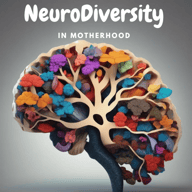Top 6 emotional struggles among mother of neurodiverse child


Mothers of neurodivergent children often deal with challenges, prejudices, and misunderstandings in their journey through motherhood.
It is equally important to acknowledge the struggle of mothers raising neurodiverse children and celebrate the unique abilities these mothers bring, respecting and supporting those mothers in their numerous challenges and difficulties.
The top 6 most frequent emotional struggles among mothers raising neurodiverse children.
Emotional and Mental Health Challenges: The demands of raising a neurodiverse child can lead to mothers experiencing increased emotional and mental health challenges almost daily. These may manifest as symptoms of stress, such as feeling overwhelmed by daily tasks, anxiety about the future, or depression due to the constant pressure. Concerns about their child's future can also impact mothers' mental well-being, leading to sleepless nights and constant worry.
Creating an environment that nurtures joy in the journey of neurodiversity in motherhood starts with self-compassion. As mothers, we often set high standards for ourselves and can be overwhelmed with daily worries and stress. But it's important to remember that we are doing our best:) We must embrace our imperfections, acknowledge that we will have good and bad days, and allow ourselves to feel various emotions to help us build resilience. We should foster a healthy emotional climate at home by practising self-acceptance, self-compassion, self-kindness, and self-love. This change in mindset reinforces the idea that it's okay to find joy amidst the chaos, which can impact ourselves and our families.
Mothers, it's crucial to remember to prioritise your own mental and emotional well-being as you navigate the beautiful yet challenging journey of parenting a neurodiverse child. Your physical and psychological health is the foundation of your ability to support your family. Nurturing yourself first can give your children even more love and strength, this is not a selfish act but a necessary one for the well-being of your entire family.
Lack of understanding, acceptance and support: Mothers often face social stigma with misunderstanding regarding neurodiversity, such as judgmental comments about our child's behaviour in public or misconceptions about the child's capabilities or abilities to do or not do things, which tend to lead to feelings of isolation or inadequacy. However, it's important to remember that you're not alone. Lack of sufficient support from family, friends, or community is a common issue among many mothers raising a neurodivergent child; the problem could be even more significant, especially if the mother is neurodivergent herself. Mothers, don't isolate yourself; reach out and access mental health resources or communities for mothers raising neurodiverse children; look for support in your community, family, and friends and remember there are resources and communities out there for you if not create yourself an online community as data show that more and more children are being diagnosed as neurodiverse so the parents could be facing what you and I faced in our journey.
Balancing family Needs: raising a neurodiverse child is a challenging task for any mother; however, each household will experience the challenge uniquely, depending on several factors such as the level of severity or ability of the child, whether the child is having appropriate treatment if the treatment is working as planned if the mother is neurodiverse herself of have more neurodivergent within the family, Managing the needs of their neurodiverse child within a household while also caring for other children and families. The list can go on and on, and all those responsibilities and many more can create a sense of overwhelm and guilt, impacting the mother's mental well-being sooner or later.
Self-Care: lack of time for self-care among mothers raising a neurodiverse child. Self-care is necessary to prevent burnout among mothers, so each mother must prioritise their physical and emotional well-being while focusing on their child's needs. As mothers, we should never forget the metaphor "put your mask on first" Well, remember that during pre-flight safety briefings, when the flight attendant advises all passengers that in an emergency where oxygen masks are required, we should secure our masks before assisting others, particularly children. This is especially important for us in our journey of motherhood with neurodiverse children; it took me a few years to truly understand the power of "putting my mask on first," and by doing that, I increased my ability to focus and prioritise my physical and mental well-being. Some self-care strategies include setting aside time for a hobby, writing a journal, having a worn bath/shower, listening to music, walking, practising mindfulness, or seeking professional help. When we are healthy, energised, and mentally balanced, we can better face the challenges of caring for ourselves and our families.
Navigating the Healthcare System: Finding appropriate services, professionals, and therapies can be challenging for mothers before and after the diagnostic process. Mothers commonly struggle to navigate the healthcare system for several reasons, from not finding services, limited access, long waiting lists, or inability to afford private services. Therapy does not show effectiveness, and professionals are not delivering the expected care for their children. I'm highlighting that nowadays, neurodevelopment conditions are being diagnosed very early and that we have excellent and better-informed healthcare professionals doing a fantastic job with their expertise and delivering results, increasing the quality of life for children and families. The internet has excellent free resources from very knowledgeable professionals and parents, allowing us to be better educated about our children´s condition and advocate for them while looking for a better service, professional and treatment plan.
Navigating the Education System: This issue is prevalent across all neurodiverse conditions, such as grifted, 2E, dyslexia, TDHA, TDA, and TEA, not to mention each individual´s levels of severity/abilities. Advocate for our child's educational needs plan is "one" skill among many that any mother with a school-age child needs to learn; unfortunately, navigating the rules and regulations of the special education system can be scary, intimidating, and at times overwhelming, adding to stress and frustration and affecting emotional well-being and access.
Neurodiversity in motherhood is full of challenges we must face daily. We only highlight six mothers' struggles; I am sure your list is longer. This post aims to highlight the importance of each mother focusing on her own physical and mental well-being to "put her mark on first" and have good health and mental clarity during her journey in motherhood.
Creating an environment that nurtures joy in the journey of neurodiversity in motherhood starts with self-compassion. As mothers, we often set high standards for ourselves and can be overwhelmed with daily worries and stress. But it's important to remember that we are doing our best:) We must embrace our imperfections, acknowledge that we will have good and bad days, and allow ourselves to feel various emotions to help us build resilience. We should foster a healthy emotional climate at home by practising self-acceptance, self-compassion, self-kindness, and self-love. This change in mindset reinforces the idea that it's okay to find joy amidst the chaos, which can impact ourselves and our families.
Dear mum, start self-acceptance, self-compassion, self-love, and self-care to improve your mental and emotional well-being. Please don't isolate yourself; access mental health professionals if needed, communities for mothers raising neurodiverse children; look for support in your community, family, and friends. Take care xx
